Indosole Blog & News
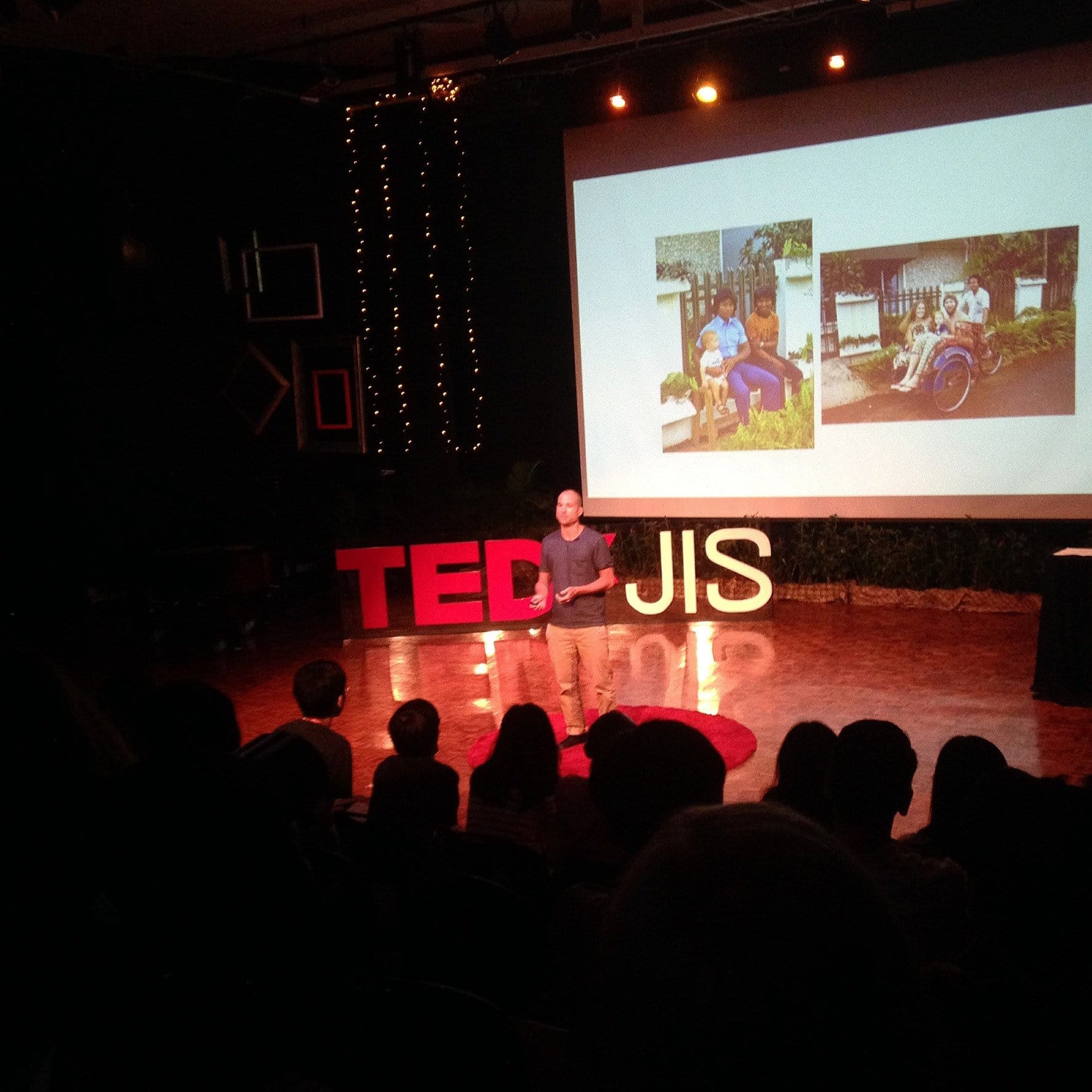
Education
Kai Paul at TEDxJIS "What if waste = $$"
It may not look like it but Kai Paul was born and raised in Indonesia. He grew up in Jakarta with his parents who were school teachers at the Jakarta International School. As a young redhead kid living in Jakarta, Kai got to experience what it is like growing up in a developing nation with a pollution problem.
This past February, Kai returned to his family’s alma mater and took the stage at TEDxJIS. Kai took this opportunity to share his passion for his home country of Indonesia and vision for the future of waste management and the emerging “Secondary Resource Market” aka “Modern Day Mining.”
“I love Indonesia with all my heart, and that is why I am willing to fight for her. Because I am afraid of the changes we see happening before our eyes.”
Young Kai and his Dad on a boat in Bali (1980’s)
Young Kai and his Mom in the clean Bali ocean (1980’s)
Now, Kai is a grown man and managing a business (Indosole) which focuses on preventing waste tires from ending up in landfills and giving them new life as saleable products. Kai has done substantial research on the pollution problems facing Indonesia and the world. It’s time to turn those problems into profitable solutions.
“If you break down a tire you will get Rubber, Oil, Steel, all valuable commodities on their own.”
Every day we are taking resources from the earth - it’s time we take less and work with what we already have - the tons of usable waste materials both going to and sitting in landfills. Let’s look at this waste as an untapped resource.
What if we started doing things differently?
What if businesses and the governments started investing into these ideas and if each one of our communities adopted them?
Click HERE to watch Kai’s Talk now and at the end ask yourself “What if.”
Enjoy!
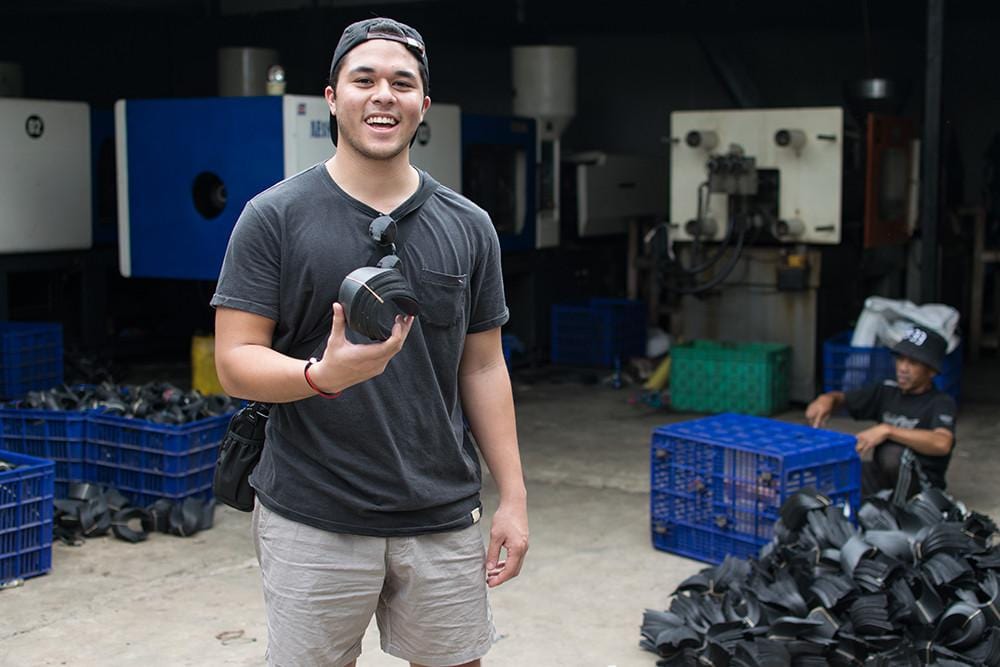
activism
Topiku "The Accidental Entrepreneur"
As a brand that started as a hobby and with suitcases full of sandals wheeling through airports, we at Indosole enjoy hearing about other brand's journey and their respective labor of love. We are all underdogs!
We met the Topiku brothers Max and Monty last year at an event in San Francisco. Turned out they have a similar mission for the country of Indonesia and a cool conscious product. We asked them to tell their story and equally important to touch on the challenges they have faced along the way.
Here it is and we hope you enjoy Topiku's story!
"The Accidental Entrepreneur"
Building a business is tough. Building a socially-minded one is even tougher. Add 9,000 miles of separation and being a full-time college student into the mix, and you have Topiku’s current situation.
Hi, I’m Monty, a 22 year old senior at the University of Southern California, founder and CEO of Topiku: a social enterprise based in California and Indonesia. We’re on a mission to become the world’s most sustainable hat manufacturer, with products handcrafted from upcycled + recycled waste by Indonesian artisans.
We’re still young (we’ve been building our brand for the lesser part of two years), but it’s been incredible watching our mission and network organically grow. However, it’s been a constant struggle learning how to balance and schedule my time between school and personal endeavors.
Back in the summer of 2014, I was an aimless freshman in college who had just given up his dream of becoming an architect. I hated having to fly back to Jakarta to visit my family with all its traffic, craziness, and dirtiness—a stark difference from the comfortable southern Californian atmosphere that I had grown accustomed to. Driven by an overarching desire to create a positive social and environmental impact, I took an internship at a NGO called XS Project. They worked with a community of trash-pickers who lived in a slum of Jakarta, creating value-added products out of the waste that they collected as well as providing front-end jobs. Whilst working for them, I proposed a new product for them: a hat made from upcycled car seat vinyl. Long story short, they rejected my idea; disheartened, I tossed the idea on the backburner.
It wasn’t until I returned to campus—when I showed my friend (who eventually became my business partner) my prototype hats (see below) and told him my story—when the notion of Topiku as a business was born.
Reflecting back on Topiku’s formative days on the heels of a quick Topiku Indonesia trip reminds me of just how far I’ve come on this journey of accidental social entrepreneurship.
Back then, I definitely did not fully understand the multifaceted and complex concept of sustainability—I simply had an idea for repurposing discarded materials. Was using salvaged material enough to justify sustainability? I wasn’t thinking about who or how they would be made...
Today, Topiku has grown to encompass more than just a mish-mash of up-cycled materials; it’s really come to represent an entire ecosystem of not just professional meaning, but a deeply personal one as well. Over the past few years, I’ve had the honor of working closely alongside inspiring artisans, whom I count amongst the most dedicated and passionate individuals that I’ve ever met.
Some highlights:
Watching Ninda, who hand-sews all of our bamboo tees, grow from a sole-proprietorship to managing a team of five
Visiting Anton’s innovative factory in Gresik, Surabaya, which has engineered a process for recycling cotton and polyester sourced from old clothes and plastic bottles
Collaborating with Bang Sano, who leads the environmental movement in Indonesia through his organization, Waste4Change, on various initiatives, from mentorship, to advocacy, to sponsorship of 12 of his trash-pickers’ health insurances
And finally, last but certainly not least, observing our community of hat artisans in Cigondewah, Indonesia—led by Kang Asep—develop into a thriving village, where incomes are re-invested into things such as education and health, and corollary industries have emerged as a direct result of exposure to sustainable products and international markets.
“I want to dispel the notion that sustainable, socially-impactful products come at the cost of good design and affordability.”
As our brand has grown, the bottlenecks and challenges of working with trash as an input have become more apparent. At times, there can be a tension between the trade-offs of good design and good recycling; it really is a balancing act. Many companies with an emphasis on recycling can have some very—for lack of a better term—obvious-looking recycled products (read: ugly and badly designed), take for instance the blatantly upcycled/recycled tote bags that you might find in Ubud or Costa Rica (or even Whole Foods now!).
Do a Google search for “recycled hat” right now—you’ll find some creative ideas, but nothing you’d wear casually. The designs really don’t leave much to the imagination. I want to dispel the notion that sustainable, socially-impactful products come at the cost of good design and affordability.
Thankfully, this past trip has addressed many of the issues that we’ve been facing—particularly scalability. For the past year and a half, the main base of our hats has been made out of upcycled cotton jacket cuts. Upcycling is awesome because it diverts materials from ending up in landfills as well as incentivizes upstream, sustainable employment (read: trashpickers) and even has additional positive externalities, such as waste management and ecological responsibility advocacy. However, small-batch upcycling is not inherently sustainable and is a true bottleneck to spreading our message. This is where Anton, who I mentioned earlier, comes into play; unlocking an efficient production system that can enable sustainable production—in both the environmental and economic sense—is truly pivotal. His source of raw recycled cotton and rPET yarn will allow us to expand our capacity and catalogue in the long run.
I couldn’t be more stoked to be where I’m at today; passionately putting hours on a project that has quickly become my top priority. As the company has grown, so have I. It’s funny to be able to participate in events that would have made me uncomfortable in the past, namely, public speaking. Last week I had my first ever business pitch competition, and I just got word I’m moving on to the final round. On Tuesday I was invited to speak at UC San Diego for their Green Talks event to speak about my understanding of sustainability. Totally had to miss class for all these events ;)
In this age of mass information and demagoguery, it’s easy to feel pessimistic about the world; but looking ahead, I am optimistic that folks like you and I are beginning to appreciate values such as fair trade, women’s empowerment, environmental sustainability, responsible waste management, and cultural preservation through conscious capitalism. I truly believe that social enterprises such as ourselves and Indosole can empower these values to flourish—but we can’t do it alone. It will literally take a village.
Monty | monty@topiku.co
You can find Topiku at topiku.co or:
Instagram
Facebook
Store
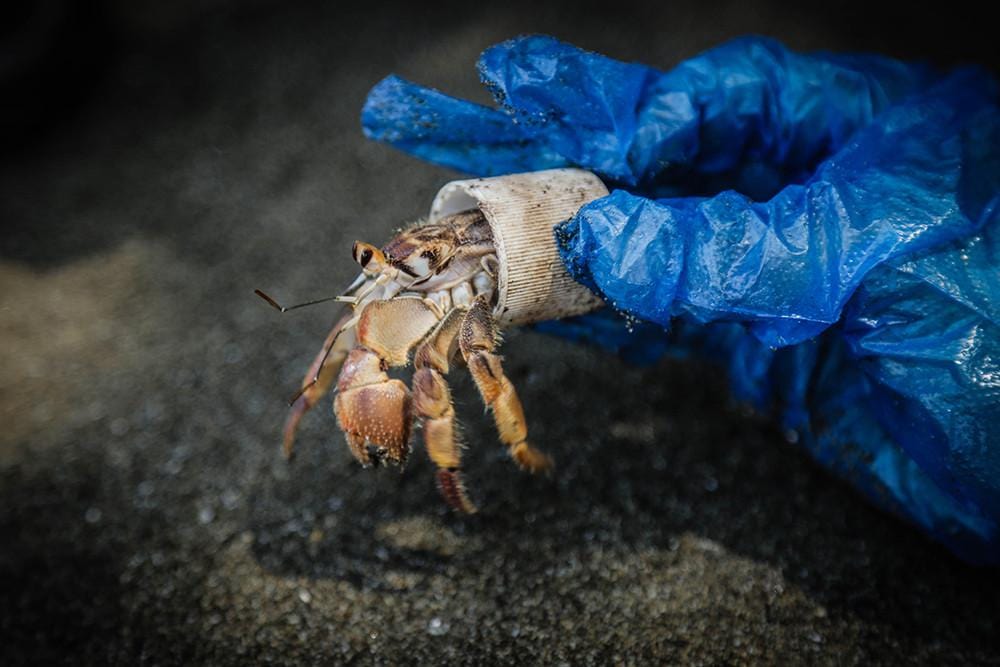
activism
Guest Blogger - Bodhi Surf School
This week we teamed up with our friends, donation partners, and fellow B-Corp at Bodhi Surf School in beautiful Costa Rica.
Run by a crew of dedicated and loyal ocean, surf, and health advocates the Bodhi team likes to promote a responsible way of life and good ole fashioned Pura Vida.
Enjoy the read!
Indo Crew
Photo Credit: Emi Koch of Beyond the Surface International
Harnessing Consumerism to Solve Environmental Issues
While doing one of our regular Service & Surf beach cleanups last summer, one of the kids found a hermit crab which, instead of having a regular shell, had a plastic cap as its mobile home. This struck a note with all of us doing the cleanup, that our actions — even small — have profound consequences that we often forget to consider. There are many similar images and videos that circulate and even “go viral” due to the phenomenon of social media, so most of us have seen sea turtles needing to have plastic straws pulled out of their bodies, the surfer going through a tube full of trash, or a bird whose feathers are covered in oil after a spill. These images are graphic, heart-wrenching reminders about how we as humans need to collectively make better and more educated choices and consider the kind of planet we want to live in and leave after we are gone. That we are headed towards calamity, at present, seems like an unavoidable reality.
Photo Credit: Bodhi Surf
Here at Bodhi Surf School, (a surf and yoga camp in a small town called Bahia Ballena, in the Southern Pacific region of Costa Rica), we have a unique way of grappling with human impact and its wide-reaching effects. Most of our guests come from cities and more populated areas, places where seeing trash everywhere doesn’t seem surprising. In contrast, when you see garbage in such a pristine environment as our local Marino Ballena National Park (whether it’s washing up on shore or being left by beach-goers), it just seems out of place. Luckily, we don’t have very much of it in comparison to many beaches around the world — something we hope does not change. For that reason, since our inception in 2010, we have used the park (both our playground and classroom for surf lessons) as a stark and thought-provoking example for our students and guests to consider both their individual and our collective human impact on the planet. We also utilize this amazing experience of learning to catch and ride on one of nature’s most powerful entities — the ocean — as a catalyst to spark pro-environmental behavior change in our guests, further providing tools for this change to last long after their sun tans have faded.
Photo Credit: Bodhi Surf
Consumption is necessary
While it’s easy to get people to commit to placing garbage in the appropriate spots instead of littering, picking up trash when they see it, or recycling what can be recycled, many believe that those actions (while well-intentioned) are too little, too late. Arguments abound in the conservation world that the root cause of the environmental issues we face is human consumption. That we (in the developed world in particular) need to greatly reduce our consumption lest we burn through our planet’s resources and leave an insurmountable crisis in our wake. From this way of thinking come terms like “sustainable” and “leave no trace” — the ideas that in order to ensure the wellbeing of the planet and its inhabitants, humans should be leaving little or no impact on the planet. This notion seems unfeasible if you’re an optimist, and impossible if you’re a realist. The fact is, that stopping consumption altogether is not a productive way to try to live, nor will it ever be a paradigm that wins over a majority of supporters. None of us, as it turns out, want to stop consuming.
However, reducing our collective consumption (all that we buy, use, ingest, use, or destroy) is not only doable, it is also going to prove to be necessary in order to keep a harmonious balance in our natural world. After all, humans have an uncanny ability to live with very little when we are forced to. The simple task of asking ourselves, “do I really need this?” before purchasing any product can go a really long way. There is an argument — just as we need to ingest food and water, possess clothing and shoes, and have several other things to survive — that the ability to consume products and experiences is a driving force of inspiration and motivation for humans. One main reason that people work so hard is because they want to be able to possess things — and that is a universal truth that bears keeping in mind.
Using consumption as a tool for good
At Bodhi Surf School, we are proponents of “experiences rather than things”, and we like to encourage people to channel their desire to consume into have memorable experiences instead of purchasing more [often unnecessary] things. For example, to reduce their impact, a family could do an outdoor excursion or cook a big dinner together instead of exchanging gifts at Christmas. Travel is also a memorable experience, and even though international travel can be very impactful (consider the CO2 emissions from plane travel alone), we truly believe that the educational benefits of seeing places beyond your home and learning the cultures, traditions, and ways that other people live can be so life-changing that, often times, they mitigate the impact itself.
As for products, just as we need to reduce our consumption, we can also make very educated choices about the remaining products that we do need to consume. Instead of purchasing three pairs of jeans because they are on sale for a fraction of the price, we can choose to purchase one pair of nice jeans made by a business that is doing its part to reduce its environmental footprint and make a positive difference in the world. Or perhaps we can opt to buy sandals from a company that has come up with a creative solution for two “problems” — eliminating already-existing pollution and using it to create a necessary product, i.e. using repurposed tires as the soles of their shoes. Bodhi Surf School was drawn to Indosole for this very reason, just as we are a business looking for creative ways to reduce or mitigate our inevitable impact, we have deep respect and admiration for other companies who go above and beyond to do the same. Businesses of all sizes and in all industries can “opt in” to corporate and environmental responsibility, and in an effort to tackle these human-created issues that are becoming more and more difficult to ignore, we would argue that they have a duty to.
For all it’s drawbacks, consumerism could prove to be a solution for the environmental crises at hand. The winds of change are starting to blow, and if enough consumers choose to make educated choices about who they give their money to, more businesses would be forced to go where the market is calling, causing a spiral-upward effect. For all our imperfections, humans have proven to thrive under adverse conditions, and we have a long history of coming up with creative solutions to the problems in front of us. We call it capitalism when we spread these solutions far and wide, and profit when others people recognize their value. We sincerely hope that this time will be no different.
Thank you for reading,
The Bodhi Surf School in Costa Rica

Heyy Ladies! Workshop Clothing Swap
Since 2009, we have made it a ritual to donate clothing to our loyal and focused Indo artisans. The donations are wheeled over in large rolling bags from California and typically consist of American brand labels (which they go bananas for) and clothing that they can either wear themselves or bring home for their children. Most of the Indo artisans have larger families of 3-4 children and they will wear these clothes as well as hand them down to the younger siblings as they go.
This time, we put together assortments of clothing for the ladies specifically. The women at our workshop are the backbone of the operation and are managers as well as skilled seamstresses and quality control specialists. We wanted to hook them up with more functional and durable upcycled clothing but also some cute stuff to wear outside of work :)
Thanks to 4 lovely ladies from San Francisco, we had clothing for all seasons and all sizes which were diverted on their path to the local Goodwill in SF. Instead, the clothing was given to our crew and they were beyond stoked!
Big Thanks to (from top left to right) Zhenya, Chrissy, Kenya, Jessa and the Lulu Lemon store of San Francisco for giving our artisans a head to toe make-over of leisure wear and even summer dresses.
artisans
Meet the Indo Artisans
You asked, we answered! We received requests to share more about the artisans who make your Indos, so today we are going to introduce you to five members of our workshop crew: Yunus and Putra (tire cutting division), Fandi and Bandi (sole application), and Rani (finishing/ packaging). We have a really great...
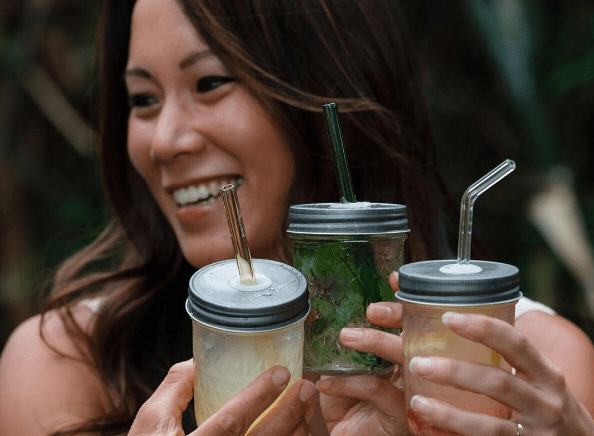
celebrations
4 Ways To Celebrate Less Wastefully
Our intern muses on the holiday season that just passed and offers tips on how to celebrate future holidays less wastefully: "Now that Christmas is over and we have entered the new year I have been thinking about ways to celebrate “better” next time. I mean better for the environment, and better for everyone..."
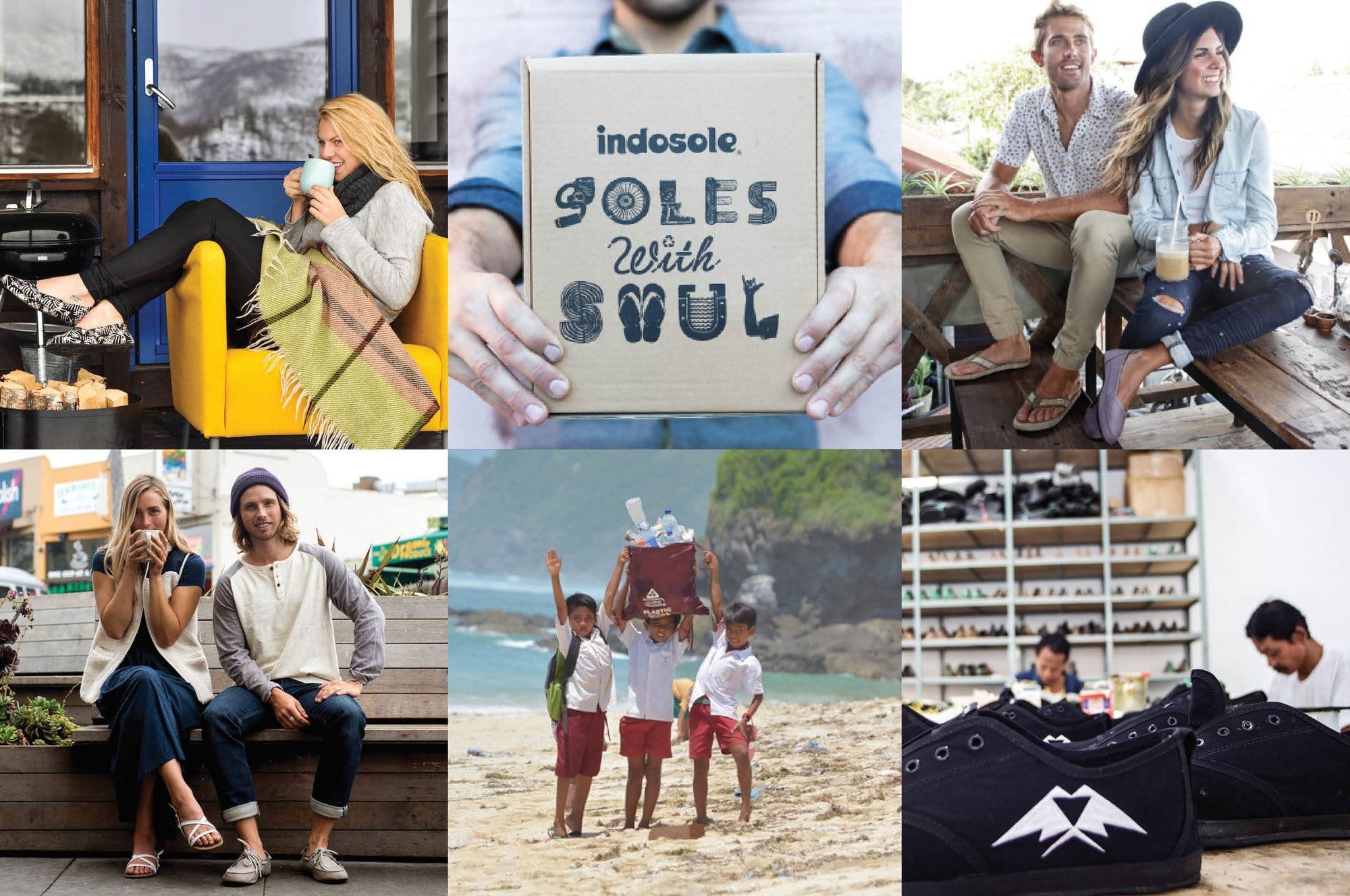
conscious consumerism
Pushing for Progress in 2017
Happy New Year 2017! We wanted to write a quick note to say thanks for your support in 2016, which was an influential year of growth and learning for us at Indosole. Your feedback and suggestions have been carefully noted and we are working hard to implement them to our freshest batches of Indos...
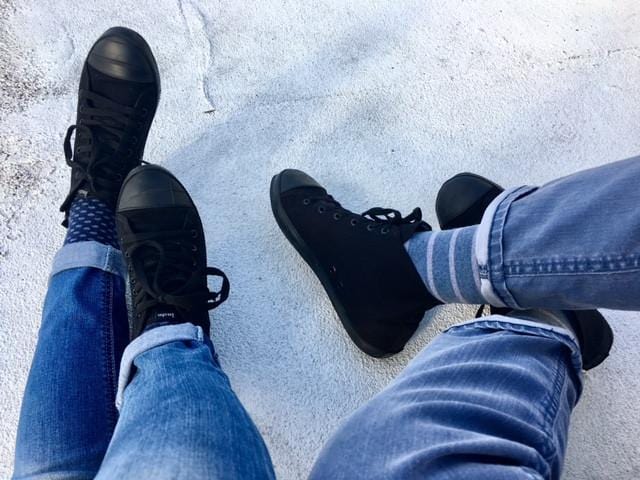
changing habits
We Love OSOM Brand Recycled Socks
Being a conscious consumer is an adjustment, but you'll find that the alternatives are out there if you look hard enough. We wanted to put one more brand on your radar - our friends OSOM Brand. They make super soft socks that are 95% recycled denim and textiles. We've blogged about the textile waste problem...
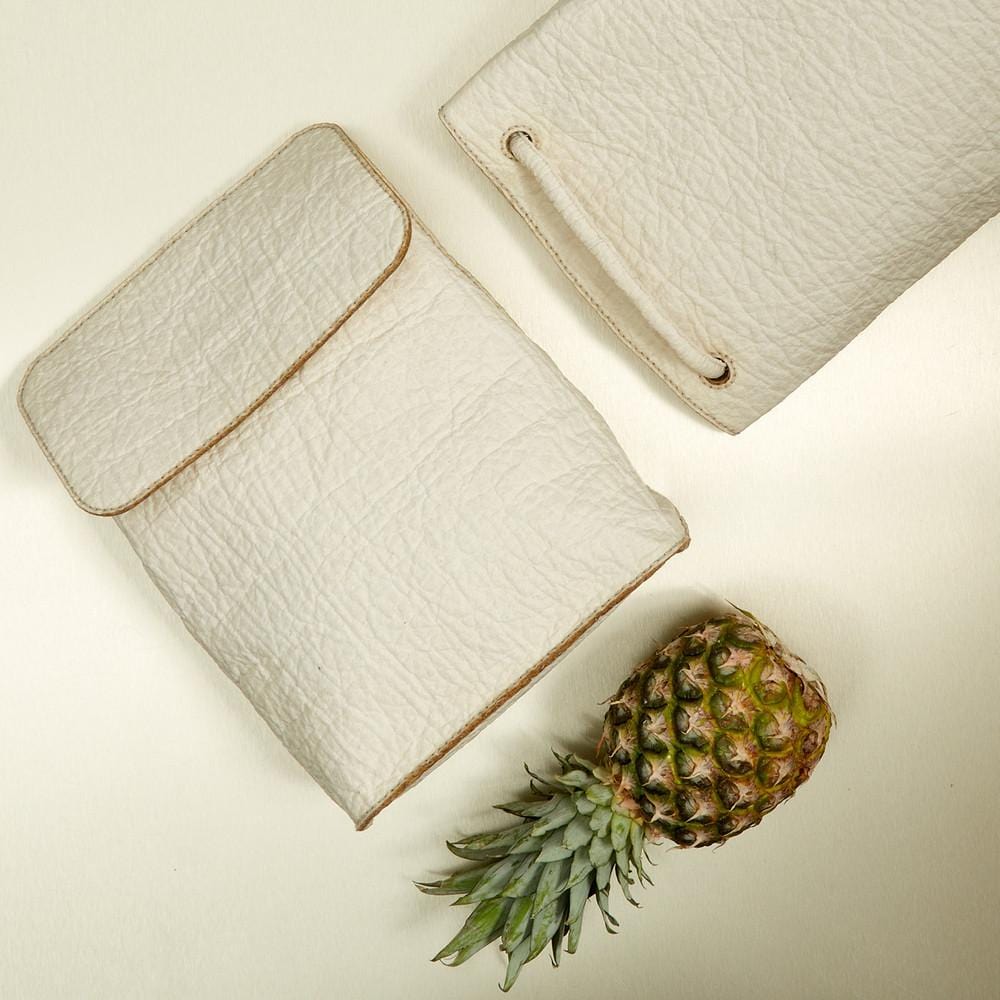
awareness
6 Ways To Combat The World's Garment Waste Problem
Currently on our radar: garment and textile waste. We wanted to share with you some of the problems that have been on our minds lately and the discoveries we have made, from innovative technology to alternative materials to inspiring brands. We hope this encourages you to read up on the problems and solutions...


